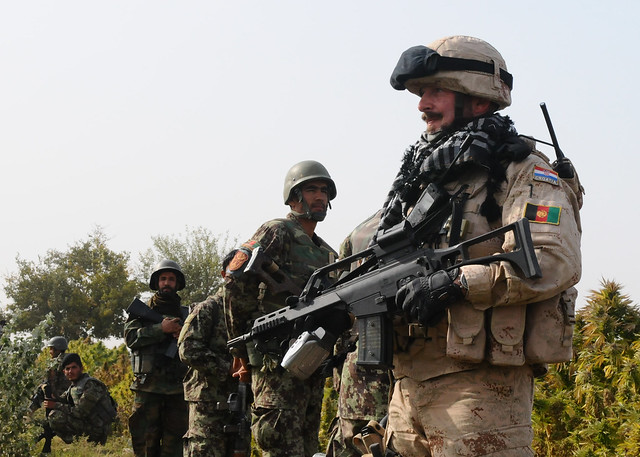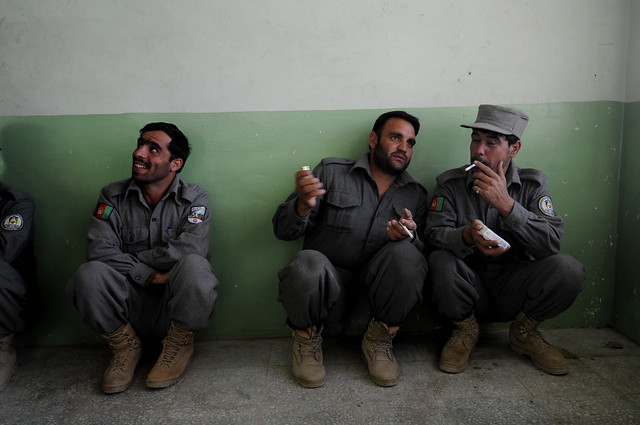Wah, no joke, this US Army instructor has the Presidents Hundred badge denoting him as one of the top 100 shooters among both military and civilian marksman. Quite an accomplishment. But our NSmen have MArksmanship badge too, so equally powderful, ok? LOL
-
IP addresses are NOT logged in this forum so there's no point asking. Please note that this forum is full of homophobes, racists, lunatics, schizophrenics & absolute nut jobs with a smattering of geniuses, Chinese chauvinists, Moderate Muslims and last but not least a couple of "know-it-alls" constantly sprouting their dubious wisdom. If you believe that content generated by unsavory characters might cause you offense PLEASE LEAVE NOW! Sammyboy Admin and Staff are not responsible for your hurt feelings should you choose to read any of the content here. The OTHER forum is HERE so please stop asking.
You are using an out of date browser. It may not display this or other websites correctly.
You should upgrade or use an alternative browser.
You should upgrade or use an alternative browser.
Fierce looking Kelingkia soldiers
- Thread starter lovesamleong
- Start date
India and US can be friends but not allies
India's foreign policy is far too complex to be oriented towards any single power
By Ravi Velloor, South Asia Bureau Chief
 Prime Minister Manmohan Singh and President Obama sharing a lighter moment at Monday's state dinner at Rashtrapati Bhavan, the Indian president's official residence in New Delhi. -- PHOTO: REUTERS
Prime Minister Manmohan Singh and President Obama sharing a lighter moment at Monday's state dinner at Rashtrapati Bhavan, the Indian president's official residence in New Delhi. -- PHOTO: REUTERS
NEW DELHI: Indians, prone to mood swings and short-term memories, were jubilant yesterday as they toasted what appeared to be a resoundingly successful visit by United States President Barack Obama.
With lofty phrases about indispensable partnerships for the 21st century and
'incredible' India, the American leader pointedly noted that his four-day trip to India was the longest he had stayed in any foreign country since taking office.
And he offered New Delhi what it wanted to hear: He endorsed its bid for a permanent United Nations Security Council seat, lifted high-technology curbs on defence and space entities, and offered close cooperation on counter-terrorism.
There was also a rebuke for Pakistan: The terrorist safe havens that exist on its soil are 'unacceptable', the President said. He even rolled back his rhetoric about US companies outsourcing jobs to Bangalore.
'US President saves the best for last, silences sceptics by saying exactly what India wanted to hear,' the Times of India headlined yesterday as the Obamas departed for Indonesia.
Now the tough part begins.
On a variety of issues, from handling China and Myanmar to the tricky question of Iran, the first African-American president of the US, a country used to having its way, is likely to turn to New Delhi and ask a question made famous by another black American thinker, the late Eldridge Cleaver: Are you a part of the solution, or a part of the problem?
That is when the trouble could start.
Indian Prime Minister Manmohan Singh has sometimes been criticised for a foreign policy agenda that is too US-oriented. Even so, India's foreign policy, shaped by former prime ministers Jawaharlal Nehru and his daughter Indira Gandhi, is far too independent to hew to the fancies of a single power, however mighty.
'This is not Britain,' said veteran diplomat G. Parthasarathy. 'We are not a nation to go around saying, 'Yes sir, no sir... three bags full' to every demand from the United States.'
Besides, India's national interest is determined not just by its size and location but also ethnic composition. For instance, it has the world's second-largest population of Muslims, a factor that determines everything from its Kashmir policy to its attitude towards Iran, with which it has civilisational ties.
Take a minor issue such as Mr Obama's decision to not visit Amritsar city, seat of the Golden Temple - Sikhism's holiest shrine. Entering the temple would have required him to wear a headscarf that, the President apparently feared, would wrongly hint to television audiences in the US that he is a Muslim. So he gave it a miss, disappointing Sikhs around the world.
India's response? It assigned a Sikh protocol officer to receive Mr Obama as he descended the steps of Air Force One in Mumbai, and nominated Mr Salman Khurshid, scion of a prominent Muslim family, to be his minister-in-waiting throughout the trip.
Or take Myanmar. Amid all the praise he showered on India's democracy and civilisational values, Mr Obama minced no words in telling his hosts that he thought they were too coddling of the Myanmar junta. By playing off the strategic rivalry between Beijing and New Delhi, the junta has resisted every form of outside pressure, including that from its Asean peers, to have a more liberal regime.
Regardless of the UN Security Council seat it now occupies for a two-year term, or Mr Obama's endorsement of a permanent seat in an expanded future council, India is unlikely to harden its position towards General Than Shwe's regime.
And in Monday's restricted-level meetings when Mr Obama pressed peace talks with Pakistan, his host, usually genial and mild-mannered, bristled. 'You cannot simultaneously be talking (with Pakistan) and at the same time the terror machine is as active as ever before,' Dr Singh said later at a joint press conference with Mr Obama.
So, even as Mr Obama sometimes refers to Dr Singh as a guru and the older man reciprocates by calling him a personal friend, the undertones of the relationship are clear.
India can at best be a trusted friend, but not an ally in the traditional sense. That insight could, in the months ahead, cool Mr Obama's ardour to have an Indian permanently seated next to his ambassador in the Security Council.
The idea, Dr Singh said on Monday, is 'to accelerate the deepening of ties to work as equal partners in a strategic relationship'.
[email protected]
India's foreign policy is far too complex to be oriented towards any single power
By Ravi Velloor, South Asia Bureau Chief

NEW DELHI: Indians, prone to mood swings and short-term memories, were jubilant yesterday as they toasted what appeared to be a resoundingly successful visit by United States President Barack Obama.
With lofty phrases about indispensable partnerships for the 21st century and
'incredible' India, the American leader pointedly noted that his four-day trip to India was the longest he had stayed in any foreign country since taking office.
And he offered New Delhi what it wanted to hear: He endorsed its bid for a permanent United Nations Security Council seat, lifted high-technology curbs on defence and space entities, and offered close cooperation on counter-terrorism.
There was also a rebuke for Pakistan: The terrorist safe havens that exist on its soil are 'unacceptable', the President said. He even rolled back his rhetoric about US companies outsourcing jobs to Bangalore.
'US President saves the best for last, silences sceptics by saying exactly what India wanted to hear,' the Times of India headlined yesterday as the Obamas departed for Indonesia.
Now the tough part begins.
On a variety of issues, from handling China and Myanmar to the tricky question of Iran, the first African-American president of the US, a country used to having its way, is likely to turn to New Delhi and ask a question made famous by another black American thinker, the late Eldridge Cleaver: Are you a part of the solution, or a part of the problem?
That is when the trouble could start.
Indian Prime Minister Manmohan Singh has sometimes been criticised for a foreign policy agenda that is too US-oriented. Even so, India's foreign policy, shaped by former prime ministers Jawaharlal Nehru and his daughter Indira Gandhi, is far too independent to hew to the fancies of a single power, however mighty.
'This is not Britain,' said veteran diplomat G. Parthasarathy. 'We are not a nation to go around saying, 'Yes sir, no sir... three bags full' to every demand from the United States.'
Besides, India's national interest is determined not just by its size and location but also ethnic composition. For instance, it has the world's second-largest population of Muslims, a factor that determines everything from its Kashmir policy to its attitude towards Iran, with which it has civilisational ties.
Take a minor issue such as Mr Obama's decision to not visit Amritsar city, seat of the Golden Temple - Sikhism's holiest shrine. Entering the temple would have required him to wear a headscarf that, the President apparently feared, would wrongly hint to television audiences in the US that he is a Muslim. So he gave it a miss, disappointing Sikhs around the world.
India's response? It assigned a Sikh protocol officer to receive Mr Obama as he descended the steps of Air Force One in Mumbai, and nominated Mr Salman Khurshid, scion of a prominent Muslim family, to be his minister-in-waiting throughout the trip.
Or take Myanmar. Amid all the praise he showered on India's democracy and civilisational values, Mr Obama minced no words in telling his hosts that he thought they were too coddling of the Myanmar junta. By playing off the strategic rivalry between Beijing and New Delhi, the junta has resisted every form of outside pressure, including that from its Asean peers, to have a more liberal regime.
Regardless of the UN Security Council seat it now occupies for a two-year term, or Mr Obama's endorsement of a permanent seat in an expanded future council, India is unlikely to harden its position towards General Than Shwe's regime.
And in Monday's restricted-level meetings when Mr Obama pressed peace talks with Pakistan, his host, usually genial and mild-mannered, bristled. 'You cannot simultaneously be talking (with Pakistan) and at the same time the terror machine is as active as ever before,' Dr Singh said later at a joint press conference with Mr Obama.
So, even as Mr Obama sometimes refers to Dr Singh as a guru and the older man reciprocates by calling him a personal friend, the undertones of the relationship are clear.
India can at best be a trusted friend, but not an ally in the traditional sense. That insight could, in the months ahead, cool Mr Obama's ardour to have an Indian permanently seated next to his ambassador in the Security Council.
The idea, Dr Singh said on Monday, is 'to accelerate the deepening of ties to work as equal partners in a strategic relationship'.
[email protected]
Singapore Armed Forces - THE BESTEST DAR WORLD
WORD UP! Bestest at wargames.
Croatian (first and third from left), Polish (first and second from right) and U.S. (second from left) Special Operations Forces operators.


U.S. Army Sgt with laser sight on his rifle and Afghan National Police.


Afghan soldiers load ammunition



This flag looked so damn familiar.... should do the bros here proud.


Croatians troops in Afghanistan


Afghan National Army


Croatian soldier with the Afghan National Army


This flag looked so damn familiar.... should do the bros here proud.

That is the CIS 0.50cal HMG on the tripod. Sure look weird to mounted the HMG on a high tripod as the recoil will topple the HMG.
and by the way, why the barrel pointing at flag raising party, breach of TSR.

and also why the bugger half squating on top of the wall while the national flag is being raise?
Spanish soldiers with Afghani


Afghan National Civil Order Police Brigade


Afghan National Civil Order Police Brigade


I thought the only people who squat in this world are chinks!


Similar threads
- Replies
- 12
- Views
- 1K
- Replies
- 0
- Views
- 326
- Replies
- 0
- Views
- 126
- Replies
- 77
- Views
- 2K




